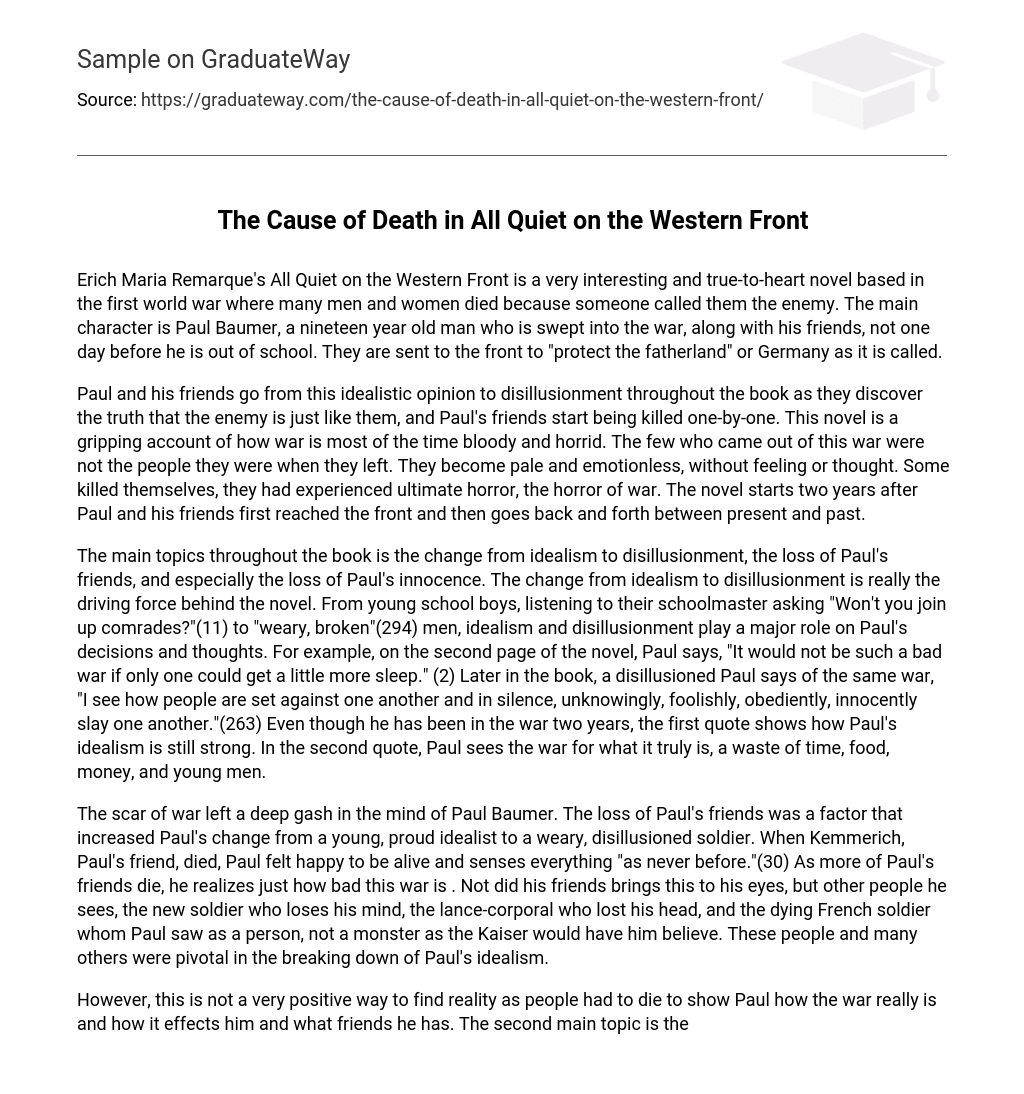Erich Maria Remarque’s novel All Quiet on the Western Front is a poignant depiction of the First World War, in which countless individuals lost their lives due to being labeled as enemies. The protagonist, a nineteen-year-old named Paul Baumer, is thrust into the war shortly after leaving school, alongside his companions. They are sent to the front lines in order to defend Germany, referred to as the fatherland.
The book depicts Paul and his friends’ shift in perspective, going from idealism to disillusionment as they realize the enemy’s similarity to them. Alongside this, Paul’s companions gradually die. The novel serves as a gripping portrayal of war’s gruesome and horrific nature. Those who survived were profoundly transformed, becoming pale and emotionless. Some chose to end their own lives, having endured the ultimate horror: war. The narrative starts two years after Paul and his friends first reached the front line, later switching between present and past events.
The central themes of the book revolve around Paul’s transition from idealism to disillusionment, the loss of his friends, and specifically the loss of his innocence. This transition is a driving force in the novel. The journey from being young school boys who are asked by their schoolmaster, “Won’t you join up comrades?”, to becoming “weary, broken” men illustrates how idealism and disillusionment greatly impact Paul’s choices and thoughts. In an earlier part of the story, Paul expresses that the war wouldn’t be so bad if he could just get more sleep. This quote demonstrates that even after two years in the war, Paul still holds onto his idealistic views. However, later on, a disillusioned Paul describes the war as pointless and resulting in wastage of time, resources, and young lives where people mindlessly kill each other out of obedience. This shift in perception signifies Paul’s realization of the true nature of war.
The impact of war left an enduring mark on Paul Baumer’s psyche. The loss of his comrades played a significant role in Paul’s transformation from a youthful, proud idealist to a fatigued, disenchanted soldier. Upon the death of Kemmerich, Paul experienced a newfound appreciation for being alive, perceiving everything with heightened intensity. As more of Paul’s friends perished, he gradually recognized the true horrors of war. It was not only the deaths of his friends that opened his eyes, but also encounters with other individuals—a newly enlisted soldier who succumbed to madness, a lance-corporal who lost his sanity, and a dying French soldier whom Paul empathized with as a human being, rather than the monstrous enemy portrayed by propaganda. These individuals, along with countless others, played a pivotal role in dismantling Paul’s idealistic outlook.
However, this represents an unfavorable approach to discovering reality since it required people to lose their lives in order to show Paul the true nature of war and how it affects him and his friends. Another significant theme is the loss of Paul’s innocence. Prior to the war, Paul was an intelligent individual who found enjoyment in reading and drawing. He had a promising future ahead, but the war destroyed his prospects. Every man he knew urged him to join the war, defend Germany, and return as a hero. However, his perception changed drastically after hearing the first shell, witnessing the first fatality, and killing an enemy soldier. This transformation becomes evident when Paul returns home during his fourteen-day leave. He longs to “immerse himself back in that time” when he experienced the thrill of reading books and escaping into a realm of vivid imagination. However, as he gazes upon his books, bed, old clothes, and drawings, he is overwhelmed by a “terrible feeling of unfamiliarity.”
In the end, as Paul stands up in the trench, right before his death, he combines the young, idealistic Paul and the ruthless, weary soldier Paul. He has a single unity in both, a unity that gives him the reality that war is not as bloodless as he thought. The discovery that the enemy was as human as Paul did not come until late in the book, when he was back from the training base far from the front. Not only did his idealism cover him from this truth, but training also played a role. Everyday in boot camp, he was trained to kill without thought or provocation. He never had the chance to truly look into the eyes of the enemy. They said the Allies were untrustworthy. It wasn’t until he witnessed what he had done to “the printer, Gerard Duval” (225) that he finally saw the true enemy, “the Kaiser” (205).





